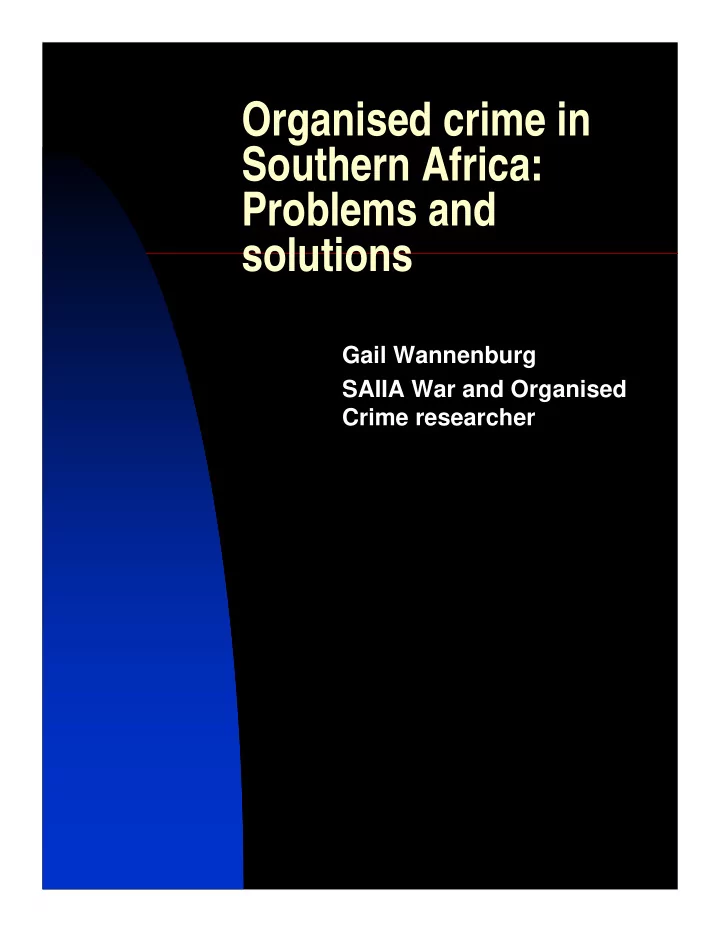

Organised crime in Southern Africa: Problems and solutions Gail Wannenburg SAIIA War and Organised Crime researcher
Introduction � Is organised crime a threat to national and regional security? Is there a role for the military? � Nature and extent of OC threat in SADC � Problems encountered in addressing organised crime in SADC � Solutions and role players
Organised crime and the Military Two broad views: � 1. Military has no role. � OC is not a threat to national � security (core values, ordinary functioning of society, use of force and territorial integrity). � A “business” compatible with political status quo/non-violent. � 2. The Military has a role OC is a threat to the state due to � � Co-operation of criminal groups across borders � Long term impact on the economy- threatens market access & practices � Weakens political integrity of gvt. � Leads to alternative structures of governance/coercion in part or all of a states territory.
Typology of OC groups
Status of OC groups in SADC SA- 192 groups (17% regional in � operation) UN surveys (1998-2000) • Drugs -policing dependent • Car thefts- SA, Tunisia, Zim, Zambia • Robberies - SA, Zim, Seychelles, Zambi Tunisia (SA ranked 4 th in world) • Fraud- Seychelles, SA, Zim, Tunisia, Zambia (SA ranked 14 th in world). Costs R40 billion p.a • Total crime (per GDP) Zim, SA, Zambi (Zim at 3 rd and SA at 5 th in world)
Impact of OC and corruption in SADC Reduces GDP by 0.5-1% p.a � � SA- drug money distorts monetary policy � Moz- $50 million drug money p.m - artificial inflation of SE � Angola- 5-10% of investment/ $1 billion oil revenue lost High levels of OC correlate with low � levels of HDI WB findings: African conflicts due to � economic rather than social problems Concentrate on impact -but note that � OC can be beneficial to state making in short-term.
Structural problems in addressing OC in SADC � Weak/failed states Not suitable for OC unless � � logistical infrastructure (Bout), � financial systems or cash commodity/ enforceable IOUs e.g Angola � Corruption is centralised e.g DRC � Near to markets e.g East Africa � Risk of detection low � Rudimentary legal system/alt. systems of governance � No legal regime regulating trade e.g. DRC (1/6 revenue), Angola- no norms for illicit/licit � No consensus on legal system
Continued � Weak state capacity � DDR and contraction of army- threatens coverage e.g DRC/Angola � Few mechanisms for regulating disputes e.g DRC 2 courts � Weak law enforcement e.g DRC 500 CID, no clarity on reporting, poor intelligence and information collection/coordination Border comm.- identity/political � alignment related to kinship ties � Corrupt governments and weak civil society � Natural resources- corruption is rife � Media and CSO frequently mirrors factions in government
Problems in addressing OC � Strategic planning and coordination among government departments � OC concern is not on agenda of key sectors (external focus) e.g DTI/Finance/Home Affairs � Gaps in information gathering, collection and use in planning (falls between cracks) � Mandates of agencies and reporting militate against better coordination � Simplistic monolithic view of OC � ML - 2/3 people- most countries cant regulate it (e.g DRC 0.02 % banked) � Drugs - extensive supply/logistics chain- alliances with producers � Vehicle related-alliances with areas with no systems.
Regional/international problems in reducing OC � Regional organisations � Economic versus security integration factions e.g SIPO � Awareness of link between economic integration and OC is low � May not be in interests of some Governments to address OC International organisations � � Peacekeeping- civilian component frequently does not have expertise in OC � Composition of PK contingent sometimes promotes future OC linkages e.g ECOWAS in Sierra Leone � Emphasis on sophisticated systems rather than basics
Pull factors for OC Increased demand for illicit � commodities e.g drugs Geographical location � Privatisation of state assets e.g � borders/transport and indigenisation Trade liberalisation and free market � reform e.g Mozambique, DRC Information technology and � increasing ease of travel
Possible solutions and role players DOD/NIA � Key driver in strategic planning and � intelligence - placing issue on agenda of key sectors and plugging information gaps Fleshing out SIPO -increasing integration � of economic and security plans More input on efficacy of UN PK � operations in African context Finance/DTI/SARB/SARS/Mineral � Awareness of impact of trade strategies on � OC and visa versa e.g Zimbabwe, Moz Strategic plans include explicit measures � to reduce OC e.g DTI Information channeled to DoD and NIA � Research on informal sector and its impact � on economy and OC
Possible solutions and role players � Home Affairs � Policies take into account research- distinction between informal trade and OC e.g easy trade visas/no tariffs- separate legal and illegal trade � Special dispensation for border community Police agencies � � Improve information collection and sharing ( increased liaison internally and externally) � Build capacity in crime analysis in SA and region � International efforts- more focus on disruption - involvement of local govt agencies e.g Metro, housing etc � Don’t get hung up on “Al Capone” approach- use other methods e.g SARS
Solutions and roleplayers Other departments : � � Criminal Justice cluster- capacity building in crime prevention, best practice � Independent institutions- Anti-Corruption commissions etc- hunger for increased information and moral support across region � Civil society � Promote CSO networking and increase liaison in region � Research by CSO is useful given constraints of diplomatic relations
Recommend
More recommend